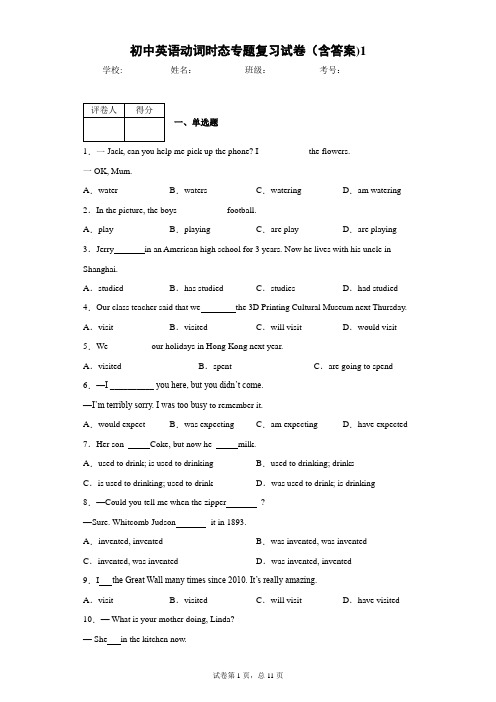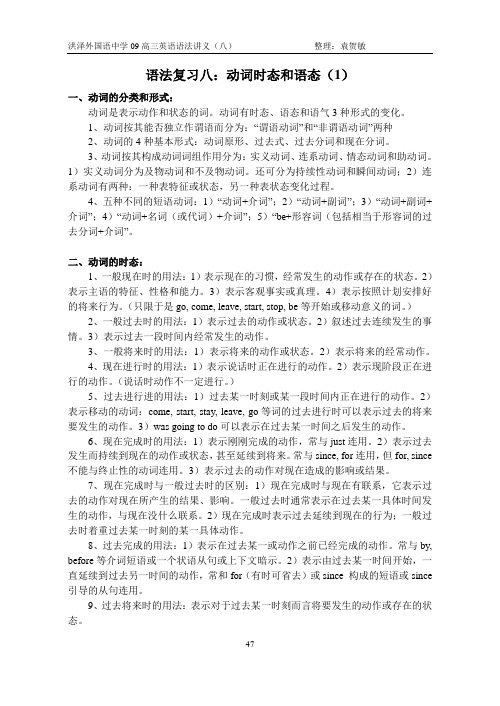动词时态复习(一)
动词时态考点聚焦(一)

u a
n o
‘ Ⅱ3 p ln a
E 】
qs I
~ S 乙 iT u
ea
H9 q
‘
o
p
9: 0 3
to m
e n
o rr o w
.
is le
a
D
e e t to o t
e
w a n
ill l e
D
.
e r e
ke
u
p la
r
;b r
k
s o u t r
G in
th a n
has
a n
h
d 10
v e s m
9
一
.
Is y
E
n
o u r
da
ghte
x a m
i pre pa r
a tio n
g fo
th e
C
o
Ue g e
y th in g
e r t is e
。
d
o n
T V
a
,
.
I
w
c a u e e
bad
th e r
da y
in
a n
d
m
y
13
.
T h
e
T V
s e
i r
e s o m
Th e
a
Ga
o
f
h
the
Se
l
,
—
w
h ic h
—
一
ke
.
d
r u
.
is
B
.
a
d a p t e d fr
动词时态课件(1)

我们时常相互通信。
常与always,usually,often,sometimes,every day,once a week,yearly 每年,monthly每月, 等时间状语或频率副词连用。
(2)表示主语现在的性格、特征、能力 eg.He works hard.他努力工作
(3)表示客观事实或普遍用法
分 现在分词 词作用,表主 状语、宾语补足
词
动
语
起形容词、副 过去分词 词作用,表被
动
The steam is seen rising from the wet clothes.
一般现在时 : 一般过去时
am is are
was were
do(does)
did
1.一般现在时
(1)表示经常发生或习惯性的动作或状态 eg.We often write to each other.
②主语+was/were+going to +动词原形
例:I didn’t know if she would come. I wasn’t sure whether he would do it . I didn’t know if she was going to come. Wang Lei said that she was going to visit
返回
三、按动词的形式可以分为谓语动词和非谓语动词
1、谓语动词(如下)
2、非谓语动词
形式
意义
与主语在人称一致 人称
举
例
I am reading now. 第一人称
数 时态 语态
语气
与主语在数上一致
He writes well. 第三人称单数
高考语法一轮复习—动词的时态语态(一)

特殊用法1: He is always coming late. He is always helping others.
进行时态与always, constantly, continuously 连用,表示说话人的“厌恶 /喜欢/称赞”等态度。
典型例题解析
例、 You _______ television. Why not do something more active? A. always watch B. are always watching C. have always watching D. have always been watching
表将来的动作,指的 是近期的,按计划或 安排要发生的动作。
特殊用法2: They are leaving for London next month. My father has gone to Shanghai and he is returning tomorrow. come, go, arrive, leave, start, return, stay, meet, get
一般过去时 yesterday, last week, an hour ago, the other day, in 1982等. He was late this morning. When I was a child, I often played football with my friend.
典型例题解析 例、(06. 福建卷. 24) Ladies and gentlemen, please fasten your seat belts. The plane _______. A. takes off B. is taking off C. has taken off D. took off
中考语法总复习 专题12 动词时态(上)(原卷版)

中考语法总复习专题12 动词时态(上)命题点一一般现在时►重点用法概括►易错点解读主将从现的“从”,仅限于状语从句,宾语从句不适用。
I don’t know if Lucy will go to Jack’s party next Sunday. If she goes, so will I.(前一个if,意为是否,引导宾语从句;后一个if,意为如果,引导状语从句)。
【例1】.(2021·吉林长春·模拟预测)The teacher told us that the sun ________ in the east. A.rises B.rise C.rose D.rising【例2】.(2021·天津和平·一模)To catch the first bus, Bob ________ up at six o’clock every morning.A.gets B.was getting C.is getting D.will get【例3】.(2021·广西柳州·中考真题)He________ like his brother.A.look B.looks C.looking【例4】.(2020·辽宁盘锦·中考真题)If our school __________ the pop singer to the concert next week, we will be happy.A.will invite B.invited C.invites D.is inviting【例5】.(2020·四川凉山·中考真题)—Let's go camping if it____________ next Saturday. —But nobody knows if it ___________.A.is fine; rains B.will be fine: rains C.is fine: will rain D.will be fine: will rain随堂练习1.(2021·北京朝阳·二模)Daming ________ books with his father at 8 o’clock every evening. A.reads B.read C.is reading D.has read2.(2021·河北·石家庄外国语学校一模)The wise men say reading ________ a bridge between our lives and the unknown world.A.built B.build C.builds D.has built3.(2021·四川遂宁·中考真题)The number of the whales ________ smaller and smaller because of human activities now.A.were B.was C.is D.are4.(2021·广西柳州·中考真题)He________ like his brother.A.look B.looks C.looking5.(2021·北京石景山·二模)My dad ________ young kids how to play football every Saturday. A.teaches B.taught C.have taught D.will teach6.(2021·湖北十堰·中考真题)Mid-Autumn Day usually _________ on August 15th in the lunar calendar(阴历)every year.A.come B.comes C.is coming D.will come7.(2021·天津和平·一模)To catch the first bus, Bob ________ up at six o’clock every morning. A.gets B.was getting C.is getting D.will get8.(2021·上海松江·二模)Tim likes watching films. He _________ to the cinema with his girlfriend once a week.A.goes B.is going C.has gone D.will go9.(2021·湖南·模拟预测)Not only his friends but also he ________ great interest in science fiction.A.show B.shows C.have shown10.(2021·广西·北海市教育教学研究室二模)Jimmy with his parents_______ the sick people once a week.A.helps B.help C.helping D.are helping11.(2021·北京房山·二模)My father is very patient. He often ________ me with my homework. A.helps B.helped C.will help D.has helped12.(2021·广西桂林·中考真题)The zebra eats grass, but it ________ eat meat.A.doesn’t B.didn’t C.don’t13.(2021·黑龙江·齐齐哈尔市碾子山区教师进修学校一模)—Do you like the flower? —Yes. It ________ sweet.A.is smelling B.smells C.smelt14.(2021·吉林长春·模拟预测)The teacher told us that the sun ________ in the east. A.rises B.rise C.rose D.rising15.(2021·北京丰台·二模)Claire likes cooking. She ________ delicious food every weekend. A.will cook B.has cooked C.is cooking D.cooks16.(2020·湖北恩施·中考真题)I hear that it often ________ in Sichuan and there are usually floods, especially in summer.A.rains B.rained C.will rain17.(2020·四川广元·中考真题)Tom. together with his friends, often________ to the old people's home to cheer the old up.A.go B.going C.goes18.(2021·北京房山·一模)—What does your mother like doing in her free time?—She often ________ movies.A.watches B.watched C.is watching D.will watch19.(2020·贵州毕节·中考真题)Don't get off the bus until it ________.A.will stop B.stop C.stopped D.stops20.(2021·北京房山·二模)Mary ________ her grandparents every weekend.A.visits B.was visiting C.is visiting D.has visited命题点二一般过去时►重点用法概括►易错点解读used to do sth 过去常常做某事(否定结构:didn’t use to do sth)be used to doing sth习惯于做某事He used go out with his parents, but now he is used to staying at home alone.他过去常和父母出去,但现在他习惯独自待在家里。
专题01 动词的时态及语态(原卷版)(全国通用版)-高考英语复习

专题01 动词的时态及语态时态知识梳理重点用法1 一般现在时用法:1.be(am,is,are)动词的使用由主语的人称和数决定。
行为动词的第三人称单数加-s/es,其余人称用动词原形。
I am free tonight.我今晚有空。
The boy is ten years old.这个男孩10岁了。
They are students.他们是学生。
Bill often helps others.We like him a lot.比尔总是帮助他人。
我们很喜欢他。
2.表示经常、习惯性发生的动作或存在的状态。
It often rains in our city.我们的城市经常下雨。
3.表示普遍真理和客观真实。
The earth moves round the sun.地球围绕太阳转。
4.表示心理状态或情感的动词往往用一般现在时。
She hates rock music.她讨厌摇滚乐。
5.在时间、条件状语从句中表示将来的动作。
I will call on you as soon as I am free.我空闲时会去拜访你。
提示:一般现在时可以用来代替一般将来时,表示已经预先计划或安排的肯定将要发生的动作,句中常有表示将来时间的状语。
这一用法主要用于下列动词,如果arrive(到达),be (是),begin(开始),come(来到),go(去),leave(离开),reach(到达),start(出发)等。
The train leaves at eight o’clock.火车8点钟开车。
注意:一般现在时常用的时间状语有:today今天often经常always一直sometimes有时usually通常seldom很少on Sunday在星期天every day/week/morning每天/每周/每天早上重点用法2 一般过去时用法:1.be(was/were)动词的使用由主语的人称和数决定。
行为动词都要用过去式。
中考英语一轮复习专题知识梳理及练习—动词时态(一)

中考英语一轮复习专题知识梳理及练习—动词时态(一)一般现在时Simple Present Tense结构公式:am/is/are/do/does常见时间状语:sometimes, usually, never, always, often; every day / week / month / year / ... ; on Sunday (s) / Monday (s) /...1.经常性或习惯性的动作,如日常行为,常与表示频率的时间状语连用。
常用频度副词:every…/all the time >always>usually>often>sometimes>seldom≈rarely≈ hardly>never➢Life rarely turns out the way that we plan.生活几乎从不按招出牌。
2.表示按计划将会发生的事情,主语常常是物。
➢这列高速列车(高铁)早上9点出发去北京。
(high-speed train)The high-speed train leaves/heads/makes for Beijing at 9 am._3.表示真理或不变的事实。
➢树叶在秋季从绿变黄。
Leaves turn from green to yellow in autumn.4.在时间、条件、让步状语从句中,从句用一般现在时代替一般将来时,简称为“主将从现”。
➢如果我在纽约时有时间去购物,我会帮你去苹果店买个iPad 10。
I will buy you an iPad10 from the Apple Store if I have time to go shopping in New York.5.特别结构结构公式一:It is +一段时间+since +从句结构公式二:It has been+一段时间+since +从句♥Attention♥第一种句型更常见。
初中英语动词时态专题复习试卷(含答案)1

A.was talkingB.talkedC.am talkingD.talk
15.---you everthe new museum? --- No, I haven’t.
A.Do; visitB.Have; visitedC.Did, visitD.Are; visiting
A.traveledB.has traveledC.have traveledD.travels
28.Last week Lingling _________ a dress as a birthday present for her mom.
A.boughtB.buysC.has boughtD.was buying
39.Philip s___________her eyes and fell asleep soon.
40.Mr. Smith showed the boys how to behave p___________ like a gentleman at the dinner table.
根据句意及首字母或汉语提示完成单词
29.The spaceship _________ back some pictures since it reached Mars.
A.sendsB.has sentC.have sentD.sent
30.-What do you think of the movie The Wandering Earth?
32.Chinese people t___________their guests with a great meal.
33.Sally is such a careful girl that she s___________makes spelling mistakes.
!!!复习八:动词时态和语态

语法复习八:动词时态和语态(1)一、动词的分类和形式:动词是表示动作和状态的词。
动词有时态、语态和语气3种形式的变化。
1、动词按其能否独立作谓语而分为:“谓语动词”和“非谓语动词”两种2、动词的4种基本形式:动词原形、过去式、过去分词和现在分词。
3、动词按其构成动词词组作用分为:实义动词、连系动词、情态动词和助动词。
1)实义动词分为及物动词和不及物动词。
还可分为持续性动词和瞬间动词;2)连系动词有两种:一种表特征或状态,另一种表状态变化过程。
4、五种不同的短语动词:1)“动词+介词”;2)“动词+副词”;3)“动词+副词+介词”;4)“动词+名词(或代词)+介词”;5)“be+形容词(包括相当于形容词的过去分词+介词”。
二、动词的时态:1、一般现在时的用法:1)表示现在的习惯,经常发生的动作或存在的状态。
2)表示主语的特征、性格和能力。
3)表示客观事实或真理。
4)表示按照计划安排好的将来行为。
(只限于是go, come, leave, start, stop, be等开始或移动意义的词。
)2、一般过去时的用法:1)表示过去的动作或状态。
2)叙述过去连续发生的事情。
3)表示过去一段时间内经常发生的动作。
3、一般将来时的用法:1)表示将来的动作或状态。
2)表示将来的经常动作。
4、现在进行时的用法:1)表示说话时正在进行的动作。
2)表示现阶段正在进行的动作。
(说话时动作不一定进行。
)5、过去进行进的用法:1)过去某一时刻或某一段时间内正在进行的动作。
2)表示移动的动词:come, start, stay, leave, go等词的过去进行时可以表示过去的将来要发生的动作。
3)was going to do可以表示在过去某一时间之后发生的动作。
6、现在完成时的用法:1)表示刚刚完成的动作,常与just连用。
2)表示过去发生而持续到现在的动作或状态,甚至延续到将来。
常与since, for连用,但for, since 不能与终止性的动词连用。
- 1、下载文档前请自行甄别文档内容的完整性,平台不提供额外的编辑、内容补充、找答案等附加服务。
- 2、"仅部分预览"的文档,不可在线预览部分如存在完整性等问题,可反馈申请退款(可完整预览的文档不适用该条件!)。
- 3、如文档侵犯您的权益,请联系客服反馈,我们会尽快为您处理(人工客服工作时间:9:00-18:30)。
动词时态复习(一)
一、一般现在时
1. 表示习惯性的动作,常与always, never, every day, often, sometimes等连用。
如:The postman always calls at 7:30.
2. 表示主语的特征、性格或能力。
如:
Ellen is an honest girl, and you can trust her.
Jack writes good English but does not speak well.
3. 表示不受时间限制的客观存在,如客观真理、格言、科学事实等。
如:
Facts speak louder than words.
Food easily goes bad in hot weather.
4. 在时间和条件状语从句中代替一般将来时。
如:
Where will you stay when you get to San Francisco?
I'll pay you double if you finish the work by Friday.
5. 表示按规定、计划、安排发生的动作,常用动词有go, come, arrive, leave, start 等。
如:
The flight for Shanghai leaves at 8:30 tomorrow morning.
二、现在进行时(构成形式为:am / is / are +动词-ing形式)
1. 表示说话时正在进行的动作或发生的事。
如:
The children are making a snowman in the yard now.
2. 表示现阶段正在发生的事,此刻不一定在进行。
常用的时间状语有these days, this week, at present等。
如:
We are preparing for the coming exam these days.
3. 表示一个按计划即将发生的动作,所用动词多是转移动词,如arrive, come, go, leave, return等。
如:
The headmaster is leaving for Beijing this weekend.
4. 表示经常性的动作,常与always, forever等连用,表示赞叹、厌烦等情绪。
如:David is always helping others.
Why are you forever asking questions?
三、一般将来时
▲其构成形式之一为:shall(第一人称)/ will(所有人称)+动词原形,表示将要发生的事,但这种将来意义常带有说话人的主观态度和看法。
如:
You will feel better after taking this medicine.
This time next week I shall / will be in Scotland.
▲另一种构成形式为:be (am / is / are) going to +动词原形
1. 表示“意图”,即打算将来做某事。
如:
Are you going to post that letter by airmail?
2. 表示“预见”,即现在已有的迹象表明将要发生某种情况。
如:
Look! Here come the dark clouds. It is going to rain.
四、现在完成时(构成形式为:have / has +动词-ed形式)
1. 表示过去发生的动作对现在有影响,常与already, yet, never, recently, ever等连用。
如:
They have spent nearly a billion dollars on it already.
2. 表示过去已经开始,持续到现在(可能还会继续下去)的动作或状态,常与since, “for +一段时间”, so far, in recent years等连用。
如:
I have known Joanna since she was born.
3. 在时间和条件状语从句中,表示将来某时已经完成的动作。
如:
Frank will return me the book if he has finished reading it.
【即学即练】
I. 选用括号内合适的内容填空。
1. It ________ (has rained / rains) every day so far this month.
2. This is the second time that I ________ (am / have been) to Paris.
3. He is never satisfied. He ________ (will always complain / is always complaining).
4. Long ago, people didn't know the earth ________ (moves / moved) around the sun.
5. The market ________ (rises / will rise) and ________ (falls / will fall) as its internal feature.
6. —This letter is in French, and I don't speak a word of French. Can you help me? —Sure. I ________ (have translated / will translate) it for you.
II. 选用括号内合适的内容完成下面短文。
Dear Nick,
We 1. ________ (had / are having) a wonderful time here in Prague. We 2.
________ (have been / will be) here for three days now and we 3. ________ (have decided / will decide) to stay for the rest of the week because we 4. ________ (will enjoy / are enjoying) ourselves so much. We 5. ________ (have seen / will see)
the Charles Bridge and the Castle, and this morning we 6. ________ (walked / were walking) around other historic places, including Kafka's house. We 7. ________ (haven't bought / won't buy) any souvenirs yet, but we 8. ________ (have visited / are visiting) some good art galleries and shops. Fortunately, the weather 9. ________ (hasn't been / is) too cold so far. People 10. ________ (will say / say) it can be really bad at this time of year and of course it often 11. ________ (snowed / snows) heavily here! As this is the first time we 12. ________ (have been / are) to Prague, we 13.
________ (think / will think) that we're just lucky.
See you soon.
答案
【即学即练】
I. 1. has rained 2. have been
3. is always complaining
4. moves
5. rises; falls
6. will translate
II. 1. are having 2. have been
3. have decided
4. are enjoying
5. have seen
6. walked
7. haven't bought 8. have visited
9. hasn't been 10. say
11. snows 12. have been
13. think。
